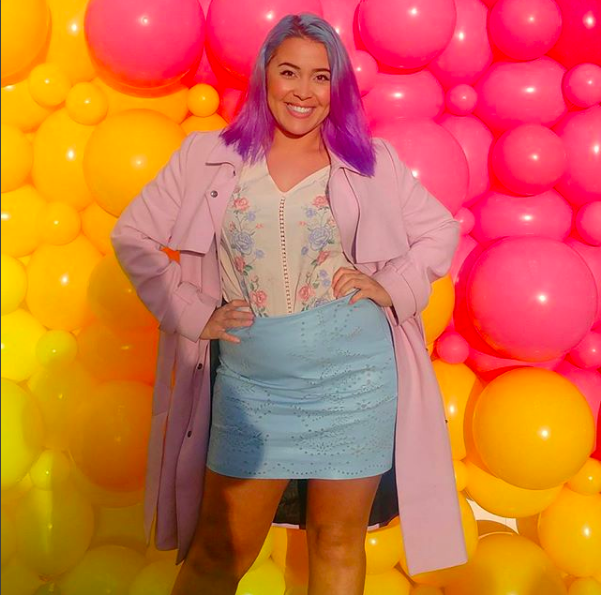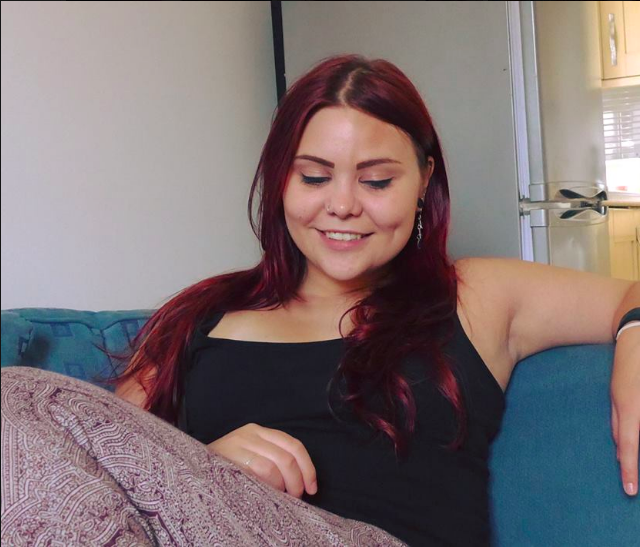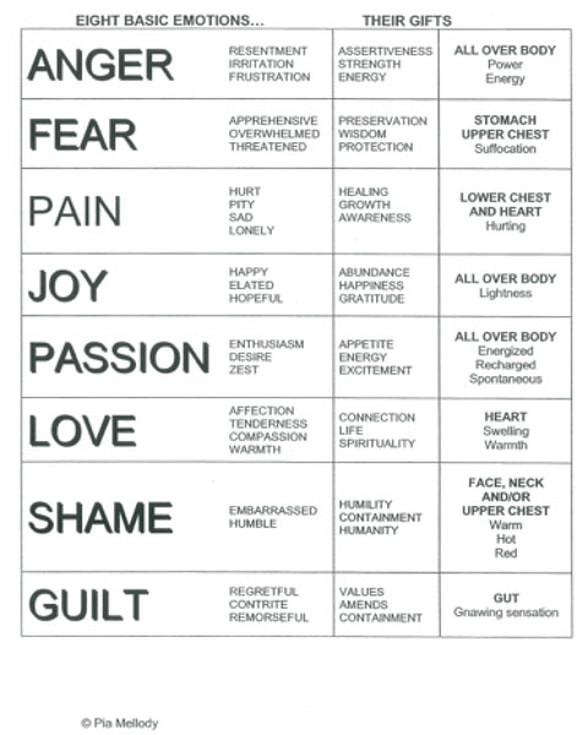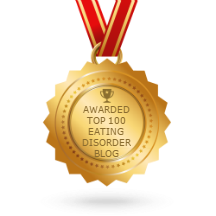- Home
- About
-
Services
- Therapy
-
Eating Disorder Trainings
>
- Clinical Approaches To Treating Body Image Issues
- Clinical Approaches To Treating Bulimia & Binge Eating Disorder
- Finding Freedom From Binge Eating
- Finding Freedom From Anorexia
- Supporting A Loved One With An Eating Disorder
- Eating Disorder Recovery Road Map
- Healing From Body Hate And Practicing Self-Compassion
- Common Questions
- Blog
- Press
- Contact
|
The other day, a client and I were talking about how she struggles with the belief that she “doesn’t deserve to take up space.” I pointed out that even the way in which she had positioned herself on my couch, demonstrated her attempts to try to take up “as little space as possible.” Unfortunately, the belief that we need to try to “take up less space,” is a common one in our culture-particularly for women. While body image issues impact people of all genders, for the purpose of this post-I have chosen to highlight the idea of “taking up space” as it relates to women. The Ways Women Are Taught to Take Up Less Space From the time that many of us were small, we have been culturally conditioned to try to “take up less space.” The following are some examples:
Chimamanda Ngozi Adichie says, “We teach girls to shrink themselves, to make themselves smaller. We say to girls, you can have ambition, but not too much. You should aim to be successful, but not too successful. Otherwise, you would threaten the man. Because I am female, I am expected to aspire to marriage. I am expected to make my life choices always keeping in mind that marriage is the most important. Now marriage can be a source of joy and love and mutual support but why do we teach girls to aspire to marriage and we don’t teach boys the same?” Diet Culture and Shrinking Women There is a $60 billion diet industry, which makes profit off our belief that we aren’t “good enough.” Body-dissatisfaction is what helps diet companies continue to sell their products. Additionally, body image issues impact people of all genders. However, I think that particularly as women it’s important to note that a focus on these issues often keeps us from “playing big” in other areas of our lives. When women are fixed on dieting and attempting to change their bodies, they are not using their energy to change the world. It’s also interesting to note that diet culture and a fixation on thinness rose in prominence around the time that women began to gain more political rights in our society. You Are Not More Valuable If You Take Up Less Space For all of the women who have been taught that you need to try to take up less space. No matter what size your body is, there is absolutely nothing wrong with your body. There is something wrong with a society where we are taught that our value lies in shrinking. You deserve to:
You deserve to take up all of the space that you need in this world. Jennifer Rollin, MSW, LCSW-C: is an eating disorder therapist in private practice in Rockville, Maryland. Jennifer specializes in helping teens and adults struggling with anorexia, binge eating disorder, and bulimia, and body image issues. Jennifer provides eating disorder therapy in Rockville, MD, easily accessible to individuals in Potomac, North Potomac, Bethesda, Olney, Germantown, and Washington D.C. Jennifer offers eating disorder recovery coaching via Zoom to people worldwide. Check out Jennifer's on-demand eating disorder and body image trainings here!
5 Comments
Pretty much anything in life that i've done which was worthwhile, involved a decent amount of fear. From facing my fear of public speaking (I have since spoken on the news and at a national eating disorders conference!) to starting my own private therapy practice-anytime I have stepped out of my comfort zone, I was initially afraid to do so. However, through my own personal and professional experiences, i've learned that sometimes feeling afraid is a sign that you are about to do something really brave. Fear and Eating Disorder Recovery Recovering from an eating disorder is all about stepping outside of your comfort zone, facing fears, and defying the voice of the eating disorder - time and time again. However, there may come a point, either in the early or later stages of recovery, when you decide that you no longer need to push or challenge yourself as much. Or you might find that you feel terrified of letting go of the "eating disorder rules," and you tell yourself that you should just "give up." The desire to stick to “what feels safe” is completely normal. Even for individuals who have not been affected by eating disorders, there is an impulse to stay with what is comfortable and familiar. A comfort zone may feel like a “safe” place to be, however no major growth ever happens there. To truly grow and strengthen your recovery, it is critical to continue to challenge yourself on a regular basis, whether it’s trying new restaurants, facing “fear or trigger foods,” being more flexible with exercise (or taking a complete break from it!), or surfing your urges to engage in eating disorder behaviors. Additionally, just because something feels "safe" or "comfortable," doesn't mean that it actually is. Your eating disorder will say whatever it needs to in order to keep itself alive. Using eating disorder behaviors may feel comfortable, however the reality is that this can be emotionally and physically dangerous-even deadly. In my work as a therapist helping people who are struggling with eating disorders, I express that the aim is to feel uncomfortable, but not unsafe. I help people to challenge themselves gradually in a way that is anxiety-provoking, yet doesn’t feel unmanageable. Thus, it can be helpful to start by pushing yourself out of your comfort zone in small and gradual steps. Feel The Fear And Take Action Anyway Often people avoid taking risks because they think that they need to wait until they feel confident enough to do so. However, the paradox of this is that you will only begin to feel less afraid and gain confidence by gradually exposing yourself to what you are afraid of Susan Jeffers, Ph.D., exemplifies this in her book entitled “Feel The Fear... And Do it Anyway” when she says, “I had grown up waiting for the fear to go away before I took any chances. When I am no longer afraid... then! For most of my life I had played the when/then game and it never worked... Fear of particular situations dissolved when I finally confronted them. The doing it comes before the fear goes away.” Rather than trying to get rid of your fear, keep in mind that it is normal and okay to feel afraid. Further, you can feel afraid and take pro-recovery actions anyway. The less that you give into the voice of fear and allow it to control your actions, the more empowered and free you will feel over time. Instead of trying to “get rid,” of the fear, I help my clients to begin to change their relationship to fear. Any process of change and growth will typically bring up some fear and anxiety. Instead of “buying into” the fear-based beliefs or messages, it’s important to start by recognizing the stories that your mind is telling you. We all have 1,000s of thoughts per day. However, just because you have a thought-does not mean that it is true. With time and practice, you can strengthen your "true voice," and use your healthy side in order to heal the eating disorder part. You Are So Brave To all of the people working on facing their fears in eating disorder recovery, you are so brave. Recovery is difficult (if it was easy, then myself and many others would not have jobs). However, it will get easier the more that you practice separating yourself from your eating disorder thoughts and taking gradual steps out of your comfort zone. My clients and the many other courageous people who are working on their recovery despite having the voice of an eating disorder yelling at them, inspire me. Marya Hornbacher sums it up best when she says: “I don’t remember when I stopped counting, or when I stopped caring what size my pants were, or when I started ordering what I wanted to eat and not what seemed ‘safe,’ or when I started just eating when I got hungry, instead of questioning it, obsessing about it, dithering and freaking out, as I’d done for nearly my whole life. I don’t remember exactly when recovery took hold, and went from being something I both fought and wanted, to being simply a way of life. A way of life that is, let me tell you, infinitely more peaceful, infinitely happier, and infinitely more free than life with an eating disorder. And I wouldn’t give up this life of freedom for the world." Jennifer Rollin, MSW, LCSW-C: is an eating disorder therapist in private practice in Rockville, Maryland. Jennifer specializes in helping teens and adults struggling with anorexia, binge eating disorder, and bulimia, and body image issues. Jennifer provides eating disorder therapy in Rockville, MD, easily accessible to individuals in Potomac, North Potomac, Bethesda, Olney, Germantown, and Washington D.C. Connect with Jennifer through her website: www.jenniferrollin.com Check out Jennifer's on-demand eating disorder trainings here! It seems like diet-culture is everywhere. From the ketogenic fanatics, to the clean eating enthusiasts, and the Weight Watchers evangelists, there are tons of people exalting the many benefits of various diet plans. Even if you are not on a traditional diet, I use the word “diet” in this context to refer to any set of restrictive food rules-barring true medical and ethical concerns. If you are feeling guilt and shame surrounding your food choices, then it is likely that you are approaching the experience of eating from a “diet mentality.” The truth is that the diet industry wants us to “fail” so that we will continue to purchase their products. Further, by jumping on the latest diet bandwagon you are supporting a multi-billion dollar industry, which makes profit by convincing us that we are inherently flawed. In honor of "international no-diet day," the following are three reasons why you shouldn’t go on another diet. 1. Diets do not help you to maintain weight loss in the long-term. The idea that people fail at diets because of a lack of willpower is a myth that is perpetuated by the diet industry. There are powerful biological factors at play, which essentially ensure that your attempt at dieting will fail. Traci Mann, a researcher who has studied dieting for over 20 years, found that there are metabolic, hormonal, and neurological changes that contribute to “diet failure.” According to Mann, “When you are dieting, you actually become more likely to notice food ... But you don’t just notice it — it actually begins to look more appetizing and tempting.” Mann also stated that as you begin to lose weight, “the hormones that make you feel hungry increase” and “the hormones that help you feel full, or the level of those rather, decreases.” Lastly, Mann explained that when you are dieting, “Your metabolism slows down. Your body uses calories in the most efficient way possible ... When your body finds a way to run itself on fewer calories there tends to be more left over, and those get stored as fat.” Thus, it comes as no surprise that studies show that 95 percent of people will “fail” at diets. Working to suppress your weight below your natural body weight is ultimately a fruitless effort and an utter waste of time. Even if you are in the 5 percent of people who can maintain a suppressed weight in the long-term, think about what you may be giving up in order to achieve this. After all, what good does it do to have whatever you deem to be an "ideal body," if you are sacrificing eating out, socializing with friends, and your interests outside of calorie-counting and obsessive exercise. Additionally, it's important to note that while diets alone do not cause eating disorders (there are genetic and temperamental factors as well), research suggests that 1 in 5 people who diet, will go on to develop a life-threatening eating disorder. 2. Weight loss is not the key to increased happiness. As stated above, diets do not work if your aim is maintaining weight loss in the long-term. However, I have a problem with the very idea of weight loss as a goal. Tying your happiness to something external is a recipe for discontent. Andrea Bonior, a clinical psychologist, exemplified this point when she stated, “It’s not the external achievement of some goal that’s going to make us happy. You think that will automatically change your life in some meaningful way, but it could be that your life pretty much remains the same.” For argument’s sake, let’s say that you were supremely happy with your appearance and body. The reality of life is that our bodies will change as we age. Ultimately, putting all of your worth and value into your appearance is akin to boarding a sinking ship. Further, counting calories, obsessing about your body fat, and reading diet books, is likely taking time away from more meaningful pursuits. Think about all of the other passions that you could explore if you gave up the goal of weight loss. What if you poured all of the time, money, and energy that you spent on dieting into something that could actually make a difference in the world? 3. Losing weight will not make you healthier. You can be considered "overweight" and be healthy. You can also be considered thin and be unhealthy. A person’s weight is simply not a good barometer of their overall health . According to an article in The Nutrition Journal by Dr. Linda Bacon and Lucy Aphramor, “Most epidemiological studies find that people who are overweight or moderately obese live at least as long as normal weight people, and often longer.” Shifting your goal from weight loss to that of adopting a few healthful habits is one way that you can work to improve your health. Bacon and Aphramor exemplified this point when they stated, “As indicated by research conducted by one of the authors and many other investigators, most health indicators can be improved through changing health behaviors, regardless of whether weight is lost.” We all want to believe that there is some magic solution that will help us to discover true health and happiness. However, the reality is that restrictive food rules and weight loss is not the answer to what we are seeking. I challenge you to really think about what is behind your desire to lose weight. After all, you can find love, feel great about yourself, and make a difference in this world, at any size. The reality is that the path towards food freedom, means that every day of your life can become no-diet day. Lisa Turner, a food writer and nutrition consultant, sums it up best when she says: “Losing weight is not your life’s work, and counting calories is not the call of your soul. You surely are destined for something much greater, much bigger, than shedding 20 pounds or tallying calories. What would happen if instead of worrying about what you had for breakfast, you focused instead on becoming exquisitely comfortable with who you are as a person?” Jennifer Rollin, MSW, LCSW-C: is an eating disorder therapist in private practice in Rockville, Maryland. Jennifer specializes in helping teens and adults struggling with anorexia, binge eating disorder, and bulimia, and body image issues. Jennifer provides eating disorder therapy in Rockville, MD, easily accessible to individuals in Potomac, North Potomac, Bethesda, Olney, Germantown, and Washington D.C. Connect with Jennifer through her website: www.jenniferrollin.com Check out Jennifer's on-demand eating disorder trainings here! She is in recovery from an eating disorder. She’s no longer restricting, bingeing, or purging, and she is finally starting to feel free from this illness. She enjoys laughing with her friends over scones and coffee at Starbucks, and is no longer spending so much time fixated on food or her body. It begins subtly. She reads an article online about the benefits of ‘clean eating’ and ‘whole foods.’ She starts following ‘clean eating’ enthusiasts on Instagram, and spends time pouring over their pictures of perfectly styled acai bowls. She can’t believe how ‘unhealthy’ she was eating before and feels a sense of pride when checking out at the grocery store, with a cart filled to the brim full of ‘clean,’ organic, and ‘whole foods.’ The Problem With ‘Clean Eating’ In Recovery There’s a problem within the eating disorder recovery community, and I’m about to share a somewhat controversial opinion. I posted a status on Facebook that was highly shared and commented on. “Saying that you’ve recovered from an eating disorder and now you eat “clean” and stay away from processed foods-is like saying you are sober from alcoholism-yet maintain a “healthy” relationship to alcohol by sticking to wine and beer. While “clean eating” may be socially sanctioned-it’s incredibly dangerous for those in eating disorder recovery (and largely unhelpful to the population in general.)” This status was prompted by yet another interview featuring someone who claims to be in strong recovery from an eating disorder, who describes how she ‘eats clean’ and avoids all processed foods. 'Clean eating’ is largely unhelpful for the general population and can create a disordered or unhealthy relationship to food. However, it’s downright dangerous for those in eating disorder recovery. Here’s the thing: eating disorders are often sneaky illnesses. In recovery, they can try to subtly claw their way back into someone’s life. Think of an eating disorder as an abusive partner, who will say anything to try to get you back into their grasp. Research suggests that the best sustained recovery outcomes, occur when individuals are able to incorporate variety and flexibility into their eating patterns. Additionally, eating disorders thrive on rules, rigidity, and a sense of “good” vs. “bad” foods. Therefore, trying to ‘eat clean,’ and the idea that there are ‘unclean foods,’ which should be avoided-is incredibly triggering for those with the underlying genetics for an eating disorder. Anytime you apply rules or restriction to your eating patterns in recovery, there is a greater chance for the eating disorder to sneak back in. Of course, there are genuine exceptions, if you have been diagnosed by a doctor with celiac-for instance. However, largely the aim is to have flexibility, variety, and pleasure in your eating patterns. Further, there’s an emerging eating disorder called “orthorexia,” which is essentially an unhealthy fixation with ‘healthy eating.’ It’s easy to see how someone might transition from one eating disorder to another (more socially acceptable) presentation of an eating disorder. This can be difficult to recover from, as many may not even recognize that it is a problem. The Bottom Line I have so much empathy and compassion for how easy it is to fall into the ‘clean eating’ or ‘fitness’ trap while in recovery from anorexia, bulimia, OSFED, or binge eating disorder. In a culture where everyone is running around promoting juice cleanses, ‘detox’ diets, and ‘clean eating,’ it makes sense that this can happen. However, what’s important is that you recognize that this is typically another presentation of your eating disorder and it’s crucial that you reach out for treatment and support if you are struggling. Additionally, it’s important to note that food and morality have nothing to do with each other. Carrots aren’t wearing angel halos and cake isn’t diabolically plotting to harm you. All foods can fit into a healthy diet, and can be enjoyed guilt-free. Because you never need to feel guilty for eating, unless you stole that brownie from the store. Guilt free foods=all foods. Further, if the goal of ‘clean eating’ is purported to be health, it is important that we recognize that good mental health is a crucial part of a healthy lifestyle. I think we can all agree that obsessively following food rules, being unable to eat a meal out with friends, and feeling ashamed after eating a brownie is not mentally healthy. Especially if you are in recovery from or have a history of an eating disorder, there is simply no way to ‘eat clean,’ quit sugar, avoid processed foods, go on a diet (even if you call it a lifestyle change!), and strongly maintain your recovery. It’s paradoxical. It’s like, saying “let me heal from my mental illness that causes me to obsess and focus on food and my body-by finding a new way to obsess and focus on food and my body.” Ultimately, you deserve to be truly free from food rules, obsession, and body-hate. Jennifer Rollin, MSW, LCSW-C: is an eating disorder therapist in private practice in Rockville, Maryland. Jennifer specializes in helping teens and adults struggling with anorexia, binge eating disorder, and bulimia, and body image issues. Jennifer provides eating disorder therapy in Rockville, MD, easily accessible to individuals in Potomac, North Potomac, Bethesda, Olney, Germantown, and Washington D.C. Connect with Jennifer through her website: www.jenniferrollin.com Check out Jennifer's on-demand eating disorder trainings here! I am so thrilled to have gotten to interview the amazing Megan Crabbe, who runs the awesome body-positive Instagram account, Bodyposipanda, and is the author of Body Positive Power, which is available for pre-order here. I've had so many clients share that Megan's Instagram account was incredibly helpful for them in their recovery. She is a true inspiration to so many and a living example that recovery is possible. Jennifer: Tell me a little bit about your struggle with an eating disorder (please avoid numbers of graphic descriptions of behaviors, so as not to trigger my readers)/ Megan: I've had a disordered relationship with food since I was a child. It was around 10 years old that the dieting and calorie counting started, and from there spiraled into a diagnosis of anorexia nervosa at 14. It took me two years to claw my way out of anorexia - and end up right back at the cycle of restriction and binge eating that had lead me there in the first place. It wasn't until I found body positivity at 21 years old that I finally began a true recovery from disordered eating, left dieting behind and truly healed. Jennifer: What do you think was the function of your eating disorder in your life? Megan: Wow, this is a fantastic question. For me, food, exercise and the numbers they add up to were always things that I could put my anxiety into. They were vehicles for my pain, and I believed at the time that they made that pain easier to manage. If you take all of your feelings of inadequacy, of never being good enough, of feeling like you can't keep hold of your life, and channel them into a calorie count, you feel like you've regained some semblance of control. You have something tangible that promises to make everything better, something that you feel you have total power over even if everything else is making you feel powerless. The numbers gave me something to hold onto, and I held on so tight, that I never stopped to realize they were also destroying me. Jennifer: Was there a turning point for you, where you really started to embrace the idea of recovery? Megan: I always say that my major turning point was seeing my dad cry for the first time in my life. It's a strange thing when you're that deep in the anorexia mindset, most of your thinking is entirely distorted by the eating disordered part of your brain, but every so often you get these sharp flashes of reality. Moments when you realise the magnitude of what you've done, or what the eating disorder has done to you. 9/10 times the eating disorder will overpower those glimpses of reality and convince you they're false, the turning point comes when a glimpse of reality is bright enough to break through, overpower the ED voice, and remind you that there is a real life out there worth fighting for. Not wanting to ever see the people I love in that much pain again was a bright enough flash for me to start the fight. Jennifer: What helped you get through the tough times in recovery? Megan: My dad. He was basically my therapist, my biggest cheerleader, my shoulder to cry on. I'm incredibly blessed to have had someone in my life who was never willing to give up on me, even when he was told that he probably should. Jennifer: What were some of your motivations in terms of pushing yourself in recovery? Megan: Anger was my biggest motivator. Anger towards my eating disorder for taking so much of my life from me and hurting everyone around me. It was anger that fueled the first bite of food and anger that pushed me to take every bite after that. I rose up and fucking refused to spend another day of my life listening to that voice because all it had ever done was destroy everything it got hold of. And I genuinely believe that every single person reading this who's struggling right now has that anger inside them as well. We have so much more power than we realise. Jennifer: What was the most helpful for you in terms of your recovery (i.e. specific skills, tools, treatment etc)? Megan: My actual treatment was kind of a shambles, this was 10 years ago and NHS (UK) mental health services were even worse than they are now. I relied massively on the support of my family, and further down the road, of my friends. One of the most helpful things for me was spending time with people who loved food. Who had never had a disordered relationship with it, who felt no shame in ordering dessert or having a second helping if they wanted it. My friend Sian became my after school snack time buddy and simply being around someone who enjoyed food unapologetically, didn't care about calories and was for most part comfortable in her own skin, was exactly what I needed at that time. Jennifer: How is your life in recovery (or recovered) different from your life in an eating disorder? What would you say are some of the benefits of being recovered? Megan: My life now is a life that I never believed I would get to live. It's a life where I'm mentally free enough to focus on all of the parts of myself that I never knew were there because they were obscured by the numbers. It's a life where I can thrive and grow and explore and find joy in the world because shrinking my body is no longer on my list of priorities. It's a life where I barely even think about food until my stomach tells me that I'm hungry, then I enjoy it, no longer even think about the numbers, and go about my day. It's living. The kind of living that staying trapped in my eating disorder never would have allowed me. Jennifer: What are some of your favorite recovery resources? (i.e. books, articles, podcasts, etc). Megan: Some books that were real game-changers for me are The Beauty Myth by Naomi Wolf, Fat! So? by Marilyn Wann, Losing It by Laura Fraser, and there are so many more. Online some of my favorite recovery and body positive accounts are @iamdaniadrianna @gracefvictory @dothehotpants @the_feeding_of_the_fox and @scarrednotscared Jennifer Rollin, MSW, LCSW-C: is an eating disorder therapist in private practice in Rockville, Maryland. Jennifer specializes in helping teens and adults struggling with anorexia, binge eating disorder, and bulimia, and body image issues. Jennifer provides eating disorder therapy in Rockville, MD, easily accessible to individuals in Potomac, North Potomac, Bethesda, Olney, Germantown, and Washington D.C. Connect with Jennifer through her website: www.jenniferrollin.com Check out Jennifer's on-demand eating disorder trainings here! I’m in the check-out line at Nordstrom Rack, when a 13-year-old boy points at a snack by the register and says, “look mom that has X many calories, in that little package! It's way too much.” As an eating disorder therapist, it took everything in me not to turn around and say, “calories are units of energy that help you live your life, not something that you need to fear.” However, by the time I had contemplated this in my head, they had already moved onto another topic of conversation. Diet-talk, fat-phobia, and comments about weight/weight-loss, unfortunately is rampant in our culture. However, like fish who have gotten used to swimming in polluted water-these kinds of topics and comments are seen as culturally normative. As a society, we’ve been conditioned to believe that fat=bad, that thin=good, and that calories (as well as certain foods) are the enemy. We’ve been sold these lies because they fuel multi-billion dollar industries, including the diet industry and the medical “weight loss” industry. If we believed that we were enough, just as we are-then we wouldn’t flock to purchase the latest diet products, expensive juice cleanses, and medical procedures. Recovering from an Eating Disorder in A Disordered Culture Eating disorders are life-threatening mental illnesses, whose symptoms often manifest in a preoccupation with food and weight. Recovering from an eating disorder in the midst of this disordered culture that we live in, can be tough. However, it is 100% possible. The following are a few quick tips for how to cope when you are feeling triggered: 1. Notice the thoughts and feelings that are coming up for you, without judgement. Practice, simply noticing any eating disorder thoughts, as well as any feelings that come up for you in response to the trigger. Instead of judging the thought, try to be curious about it. 2. Respond from your “healthy self.” Think about what you’d say to a friend, a small child, or a loved one who said exactly what you just told yourself. This concept comes from Carolyn Costin, a prominent eating disorder therapist and founder of Monte Nido. I love having clients practice writing out dialogues between their “eating disorder self,” and their “healthy self.” Often, I will have them role-play this with me in session, as well. An Example: Eating disorder self: You can’t eat that pizza, it’s so bad for you. You don't deserve to eat it. Healthy self: I always deserve to nourish myself with food that I enjoy. Food isn’t good or bad. All foods can fit in a healthy diet. 3. Recognize that any comments are really a reflection of the other person. People who are making lots of comments about food and weight, are simply demonstrating where their own focus lies. Try to recognize that any food or weight related comments are really just a reflection of the other person, and have little to do with you. If you can, try to practice imagining yourself sending some compassion to the other person, because they are still steeped in diet-culture and fat-phobia. It’s such a waste of precious brain space, and it truly is sad to see someone who is so immersed in this. There are so many better uses of time, energy, and money. 4. Set some healthy boundaries. I was talking to a wise woman the other day (shout out to Nicole Mcdermid) about how setting boundaries can actually be an act of compassion-both for you and the other person. If we don’t set healthy boundaries, often we can grow resentful and this can negatively impact the relationship. If someone is going on about their latest diet or weight loss it’s perfectly appropriate to change the subject, make an excuse to leave the room, or say “so what else is going on in your life? I know there’s a lot more to you, than your new diet!” If you feel comfortable, you could also share that you are in recovery from an eating disorder and find this kind of talk to be triggering. You deserve to set boundaries for your own self-care. Also, in modeling that these topics are unhelpful-you might be planting a seed for someone else who is stuck in a disordered mentality. Practice Self-Compassion Eating disorder recovery is hard work. Additionally, recovering from an eating disorder when everyone is running around talking about their latest juice cleanse (shout out to my liver and kidneys for rendering any kind of “cleanse” totally unnecessary), or weight-loss attempt, can be tough. It’s so important to be compassionate with yourself, if you are finding that you are triggered by comments that others are making. If you can, work to surround yourself with positive people both in person and online. While it's important to learn how to cope with triggers in the environment, you can also do your best to surround yourself with a "pro recovery bubble." Recovery is hard work, and it will be so worth it. Jennifer Rollin, MSW, LCSW-C: is an eating disorder therapist in private practice in Rockville, Maryland. Jennifer specializes in helping teens and adults struggling with anorexia, binge eating disorder, and bulimia, and body image issues. Jennifer provides eating disorder therapy in Rockville, MD, easily accessible to individuals in Potomac, North Potomac, Bethesda, Olney, Germantown, and Washington D.C. Connect with Jennifer through her website: www.jenniferrollin.com Check out Jennifer's on-demand eating disorder trainings here! Helping clients to develop insight into the cause of their eating disorder is great. However, it’s not enough when it comes to truly helping people to recover from eating disorders. Unfortunately, I still see therapists whose primary treatment approach for helping those with eating disorders is psychodynamic psychotherapy. Psychodynamic therapy is an insight-oriented therapy that focuses on helping a client to understand the influence of the past on present behavior. Now, I’m certainly not saying that psychodynamic therapy is “bad,” or that it’s not important to explore with clients the influences of their past in terms of the eating disorder. The problem is that when you stop there, or when your entire focus of treatment is to understand “why” someone is turning to their eating disorder behaviors-it’s going to be really hard for someone to recover. While it’s interesting and can sometimes be helpful in terms of having a broader understanding, you don’t actually need to know “why” someone developed their eating disorder in order to successfully treat them. It’s kind of like if someone went to a doctor with a broken arm. You don’t actually need to know why they broke their arm, in order to put it in a cast and proceed with the necessary treatment. The Importance of Setting Behavioral Goals As a therapist, I tailor treatment to each client. I use a blend of treatment that includes elements of cognitive behavioral therapy (CBT), dialectical behavioral therapy (DBT), and acceptance and commitment therapy (ACT), and sometimes FBT-informed. I could write a whole book on the key elements of eating disorder treatment, as there are many and treatment is multifaceted. However, today I want to focus on the importance of setting behavioral goals and really “getting into it,” when it comes to the client’s behaviors, thoughts, and feelings around food and their body. Eating disorders are about the food and they also aren’t about the food. We need to address the disordered behaviors and unhelpful thoughts around food, exercise, and weight-and also look at the functions that these behaviors are currently serving in the person’s life. Setting specific goals that challenge the client’s eating disorder behaviors is so important, and needs to be incorporated into treatment. It’s kind of like if someone had a phobia of driving. We could sit in therapy and talk about where their fear stemmed from, but until we actually set goals around getting in the car-it’s unlikely that the person will be able to get better. Goal Setting Around Eating Disorder Thoughts/Behaviors For homework, I typically assign my clients to list out all of their specific eating disorder behaviors, that way we can gradually start to challenge them-in a way that feels uncomfortable but not unsafe. The same way that I wouldn’t take someone with a phobia of driving and put them right onto the highway, we often start by addressing the lower level sources of anxiety and then working our way up. Another element of treatment that can be helpful, is eating with clients. I’ve gotten a lot of questions about how I incorporate this into my treatment approach. Some clients really benefit from directly challenging their food rules/fears in session. Right now, I do lunch with clients about 4-5 times a week and I also will sometimes do “challenge snacks” with clients in session. Also, if a client comes in and has not eaten very much, it’s unlikely that our session will be very effective when their brain is so malnourished. So, I always have a few drawers of snacks on-hand in my office. I also will set goals with clients (and practice in session) around speaking back to their “eating disorder self” from their “healthy self,” which I’ve found to be so incredibly helpful for many clients. What Are You Working Towards? If you don’t set goals or have a vision for what you want to life to look like when you are recovered, it’s going to be harder to work towards this. That’s why it’s so crucial to have a therapist and registered dietitian who are actively setting goals with you and helping you to envision what you are actually working towards. My approach to therapy is compassionate, yet firm. I am empathetic and understanding and I also set goals with clients and hold them accountable. As clients are making progress in their recovery, we can also start to explore the function of the behaviors in their life. Often eating disorder behaviors are a way that someone is trying to regulate uncomfortable emotions, cope with past-trauma, or deal with feelings of low self-worth. Through therapy, clients can learn healthier ways to cope with intense emotions, and we also can look at strategies for addressing the underlying issues. However, we need to be doing this in tandem (or often after) addressing the specific eating disorder thoughts and behaviors. If you are struggling with an eating disorder, please seek help. Seeking treatment is a sign of true courage, not weakness. Make sure that you are setting goals for your recovery and that your treatment team is holding you accountable. If your therapist is not setting goals with you, give them feedback or look for someone who can better support you in your recovery. Often big changes happen-one small goal at a time. Jennifer Rollin, MSW, LCSW-C: is an eating disorder therapist in private practice in Rockville, Maryland. Jennifer specializes in helping teens and adults struggling with anorexia, binge eating disorder, and bulimia, and body image issues. Jennifer provides eating disorder therapy in Rockville, MD, easily accessible to individuals in Potomac, North Potomac, Bethesda, Olney, Germantown, and Washington D.C. Connect with Jennifer through her website: www.jenniferrollin.com Check out Jennifer's on-demand eating disorder trainings here! Sometimes people who are struggling with eating disorders have the idea that they will wait until their feel “ready” to fully commit to recovery. Or that there will be a moment of magical clarity, where suddenly they are highly motivated to recover and the process feels easier. Some people do hit a point of high motivation in terms of recovery, however the problem is that if everyone waited until they felt “ready” to recover-many would die waiting. In general, people may avoid taking risks in life because they think that they need to wait until they feel “ready” or confident enough to do so. However, the paradox of this is that you will only begin to feel less afraid and gain confidence by gradually exposing yourself to what you are afraid of Susan Jeffers, Ph.D., exemplified this in her book entitled "Feel The Fear... And Do it Anyway" when she stated: "I had grown up waiting for the fear to go away before I took any chances. When I am no longer afraid... then! For most of my life I had played the when/then game and it never worked... Fear of particular situations dissolved when I finally confronted them. The doing it comes before the fear goes away." This is why it's so important to "feel afraid," and take action anyway-that is alignment with your true values. Start Before You “Feel Ready” You don’t need to feel “ready” in order to recover from an eating disorder. How do I know this? I’ve had clients (both teens and adults) who were pretty much forced into therapy by parents, spouses, or other concerned individuals in their life-who are now in strong recovery or recovered. It makes perfect sense that there may be part of you which desperately wants to cling onto the eating disorder. It’s likely that the eating disorder is serving some functions in your life right now. Also, often for people who are struggling, their eating disorder feels like a “safe” and “comfortable,” place to stay-even when it’s evident to everyone around them that it’s negatively impacting their life. Willingness vs. Willfulness In dialectical behavioral therapy, they talk about the concept of willingness vs. willfulness. I don’t need a client to feel “ready” to recover, there just has to be some element of willingness. Even if the willingness simply comes from someone else forcing them into therapy. Or it's the willingness to take their best shot at recovery, because living with the eating disorder feels exhausting. This is my favorite description of the concept: “Life is a lot like being a batter in front of a pitching machine. So what happens when you're in front of a pitching machine? There's a machine and it's throwing balls at you. And you're standing at one end and the machine is at the other and the balls start coming. You've got a bat. Now, if the balls coming at you and the pitching machine is throwing them, what are your options? Well, you could either take your bat, pull it back, try to hit the ball. Or, you could throw a tantrum. You could get really upset. You could say, 'It's coming too fast. I don't like it. I'm not doing it. I'm not hitting that ball anymore. Stop.' You think the balls would stop coming if you did that? No. Life is like that. You can get as upset as you want about life but actually life just keeps coming - one moment right after the next. What are your options? You can stand there, do nothing, let the ball go by. Or, you could stand in front of the ball and just get hit by it. Or, you could try to hit the ball. Willingness is trying to hit the ball.” You’re eating disorder is essentially keeping you in a cage. I’m asking you to commit to being “willing” to do whatever it takes to step outside of the cage (even if right now you can only commit to a short period of time). You can always decide to step back into the cage, if you find that you don’t enjoy your life in recovery-but I haven’t met anyone who is recovered who wants to go back to the eating disorder. What Are You Willing to Commit To? I know that surrendering is scary, and it’s also a sign of true courage. I’d encourage you to ask yourself, if I truly embrace “willingness” and “surrendering” to the recovery process, what steps could I take on a daily or weekly basis? Ask your treatment team to help hold you accountable. If you don’t have a team, it’s so important to reach out for help and support. Please don’t wait until you feel “ready” or “deserving” of treatment. You deserve a meaningful and joyful life. One that you cannot fully have if you continue to stay trapped in your eating disorder. Take the first step. It will be worth it. Jennifer Rollin, MSW, LCSW-C: is an eating disorder therapist in private practice in Rockville, Maryland. Jennifer specializes in helping teens and adults struggling with anorexia, binge eating disorder, and bulimia, and body image issues. Jennifer provides eating disorder therapy in Rockville, MD, easily accessible to individuals in Potomac, North Potomac, Bethesda, Olney, Germantown, and Washington D.C. Connect with Jennifer through her website: www.jenniferrollin.com Check out Jennifer's on-demand eating disorder trainings here! Jennifer: Tell me a little bit about your struggle with an eating disorder (please avoid numbers of graphic descriptions of behaviors, so as not to trigger my readers): Sarah: I developed an eating disorder when I was thirteen and by 14 I had spiraled into the black depths of the illness. I sought help, and by my own strength I was able to get a little better and maintain my life, but I was still engaging in disordered eating and exercise. I was high-functioning in some ways, but still struggling with my eating disorder for another four years before gradually starting to gain weight at around the age of 19. I gained a significant amount of weight, but this was short-lived, and my mental and physical health dramatically deteriorated between the ages of 19 and 21. Jennifer: What do you think was the function of your eating disorder in your life? Sarah: I think it was a method of control. It was a way of feeling powerful. It was a way of feeling like I was really good at something. I felt very average as a teenager, and it was my way of excelling at something. Even though I already had many talents, I just couldn't see them. And that something that I excelled at was the envy of a lot of girls (and later, to young women): to successfully lose weight. I felt so disciplined; so contained; so aloof. It made me feel special. I think there is a split between those who feel shame about their eating disorders, and so try to hide them, and those who feel pride. I felt pride. I felt like it set me apart from other people, and I felt like it made me strong. It didn't: it made me weak, and miserable, and powerless. It made me into a shell. It hollowed me out and swallowed so many of the good things about me. Jennifer: Was there a turning point for you, where you really started to embrace the idea of recovery? Sarah: I realized that I was going to have to choose between my eating disorder, and my partner at the time. I could not have a relationship with both. More importantly, I realized that I was going to have to choose between life and death. I felt so hopeless and desperate, and I felt like I could not go on. I was suicidal. I knew that I had to get out of the situation that I was in, and for me it felt like I had to opt out or opt in. I chose to opt in, and I started to make small steps towards recovery, that eventually turned into leaps and bounds. Jennifer: What helped you get through the tough times in recovery? Sarah: Knowing that there wasn't really an option to go back, because I knew exactly what that held for me. I didn't know what going forwards could bring, but I was willing to find out, however hard it was. I also knew that in order to live my life the way I wanted it, I had to be well. During my recovery, my partner at the time broke up with me. I was distraught, but it proved to me even more that I needed to move forwards. I couldn't have a healthy, happy relationship whilst I was unwell. I couldn't go traveling. I couldn't maintain my hobbies. I couldn't be anything but deeply depressed. And so I kept pushing forwards. Jennifer: What was the most helpful for you in terms of your recovery? Sarah: I came across Your Eatopia (now The ED Institute) when I was just getting into recovery and it was my lifeline throughout my recovery. I used the forums nearly every day and I don't know what I would have done without it. Jennifer: If you could go back and talk to your younger self who was really struggling, what would you want to say to her? Sarah: I'd love to think that there could have been something that would have prevented me living over ten years of my life with a torturous illness, but I'm not sure anything would have altered my course. In the end, I am who I am because of my experiences, and I would not change that for the world. Because of my eating disorder, I have learned not only to recover, but to completely reject diet culture and embrace health at every size in the process. I don't think without my eating disorder I would have come across the information that has freed me for life from the terrible consequences of believing in that culture and succumbing to it. Jennifer: How is your life in recovery (or recovered) different from your life in an eating disorder? What would you say are some of the benefits of being recovered? Sarah: I am happy. I am healthy. I am able to think. I am able to do. I am able to be. I am free to live my life in the way that I want to. My life is the opposite of living with an active eating disorder. That's not to say that everything is always peachy, because life is stressful. But I live in my own flat with my partner Josh, and we have a healthy, happy, well functioning relationship. I work full time in care with people with eating disorders. I have hobbies and interests which I am able to engage in. I FEEL good in my body. I FEEL well. There are no downsides to being recovered. Recovery is an intensely difficult journey, but it gives you your life and your self back, and the ability to discover new things about yourself and the world. It is, and will always be, the best thing that I ever did. Jennifer: What are some of your favorite recovery resources? (i.e. books, articles, podcasts, etc). Sarah: The body positivity community on Instagram. Megan Crabb's book Body Positive Power. The ED Institute. For an extensive list of all my favorite articles, book, social media sites etc, they are all listed under my website at everythingedrecovery.com/resources Follow Sarah on Instagram @bodypositivepear Jennifer Rollin, MSW, LCSW-C: is an eating disorder therapist in private practice in Rockville, Maryland. Jennifer specializes in helping teens and adults struggling with anorexia, binge eating disorder, and bulimia, and body image issues. Jennifer provides eating disorder therapy in Rockville, MD, easily accessible to individuals in Potomac, North Potomac, Bethesda, Olney, Germantown, and Washington D.C. Connect with Jennifer through her website: www.jenniferrollin.com Check out Jennifer's new training "Finding Freedom from Binge Eating!" “It seems like I’m actually experiencing my feelings, now that I’m no longer bingeing and purging my emotions,” my client in recovery from bulimia shared. One thing that almost all of my clients with eating disorders have in common is difficulty in expressing, processing, and coping with their emotions. Often eating disorders are a (temporarily) effective way for people to numb out from or attempt to regulate intense emotions, however in the long-term they often cause increased distress, anxiety, and unhappiness. A Healthy Perspective on Emotions We live in a culture where we are often taught to try to “numb out from” or to avoid our emotions. We are given this message from the time that we were children, when many of us were told things like "don't cry," or "you don't need to be sad." On the surface this seems comforting, however ultimately the message given is that we need to judge or try to suppress our emotions. People who are intensely struggling with an eating disorder often are emotionally disconnected. When unpleasant emotions surface, they may turn to an eating disorder behavior in an attempt to try to "feel better." It's important to note that we cannot “selectively numb emotions.” When we numb out from sadness, we also numb out from being able to truly feel happiness. Additionally, trying to “get rid” of our emotions is like trying to hold a beach ball under water. It takes a ton of effort and eventually it will pop back up to the surface with force. The following are a few reminders when it comes to your emotions:
Let Yourself Feel It’s so important to practice the skills of mindfulness, non-judgement and radical acceptance of emotions. This will be a crucial aspect of recovering from your eating disorder, and living a life according to your values. Turning to eating disorder behaviors, is a “temporary” fix for regulating emotions, and it often comes at an incredibly high cost. I recently heard a powerful quote that sums this up beautifully. “Your feelings will not kill you. Nobody has ever died of an emotion. They have died trying to stop their emotions” –Norah Wynne, Clinical Director at Monte Nido Vido. Your feelings will not kill you. And letting yourself experience them, and practice healthier ways to process and cope with difficult emotions, will only enhance your recovery-and your life. Jennifer Rollin, MSW, LCSW-C: is an eating disorder therapist in private practice in Rockville, Maryland. Jennifer specializes in helping teens and adults struggling with anorexia, binge eating disorder, and bulimia, and body image issues. Jennifer provides eating disorder therapy in Rockville, MD, easily accessible to individuals in Potomac, North Potomac, Bethesda, Olney, Germantown, and Washington D.C. Connect with Jennifer through her website: www.jenniferrollin.com Check out Jennifer's new training "Finding Freedom from Binge Eating!" Check out the gifts of emotions by Pia Mellody below.
|
About MeI'm an eating disorder therapist in private practice in Rockville, MD. Archives
September 2019
|












 RSS Feed
RSS Feed
